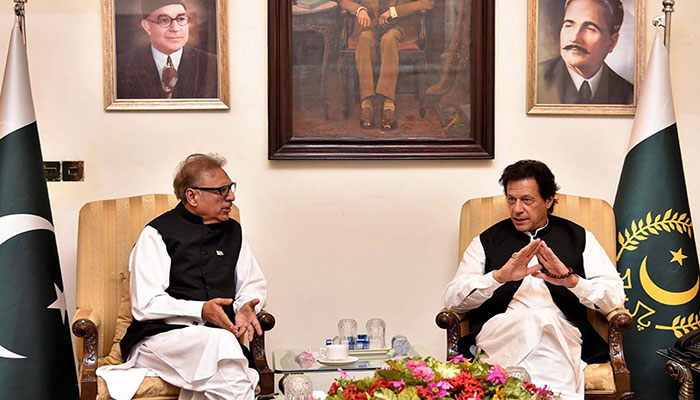President asks PM to seek trust vote
ISLAMABAD: President Arif Alvi, in exercise of his powers under Article 54 (1) of the Constitution, on Thursday summoned the National Assembly (NA) session at 12.15pm on Saturday (March 06).
"The president has been pleased to summon the National Assembly for the purpose requiring the prime minister to obtain vote of confidence under Article 91 (7) of the Constitution," the notification issued by the National Assembly Secretariat on Thursday evening said.
The Article 91 (7) says the prime minister shall hold office during the pleasure of the President, but the President shall not exercise his powers under this clause unless he is satisfied that the prime minister does not command the confidence ofthe majority of the members of the National Assembly, in which case he shall summon the National Assembly and require the prime minister to obtain a vote of confidence from the Assembly.
The resolution on vote of confidence will be decided by division of votes in the House. The prime minister will require at least 172 votes in the National Assembly of 342 membership to stay as Leader of the House.
Meanwhile, the Deputy Speaker Qasim Suri prorogued the requisitioned session of the National Assembly at the outset of proceedings on Thursday morning. The House echoed with slogans of 'Jamhooriat Zindabad' as soon as the chair read out prorogation orders.
As per Constitution, the resolution for the prime minister, seeking confidence vote, could be moved at the session summoned by the President. The NA session, prorogued on Thursday, was requisitioned by the opposition members.
-
 Hong Kong Court Sentences Media Tycoon Jimmy Lai To 20-years: Full List Of Charges Explained
Hong Kong Court Sentences Media Tycoon Jimmy Lai To 20-years: Full List Of Charges Explained -
 Coffee Reduces Cancer Risk, Research Suggests
Coffee Reduces Cancer Risk, Research Suggests -
 Katie Price Defends Marriage To Lee Andrews After Receiving Multiple Warnings
Katie Price Defends Marriage To Lee Andrews After Receiving Multiple Warnings -
 Seahawks Super Bowl Victory Parade 2026: Schedule, Route & Seattle Celebration Plans
Seahawks Super Bowl Victory Parade 2026: Schedule, Route & Seattle Celebration Plans -
 Keto Diet Emerges As Key To Alzheimer's Cure
Keto Diet Emerges As Key To Alzheimer's Cure -
 Chris Brown Reacts To Bad Bunny's Super Bowl LX Halftime Performance
Chris Brown Reacts To Bad Bunny's Super Bowl LX Halftime Performance -
 Trump Passes Verdict On Bad Bunny’s Super Bowl Halftime Show
Trump Passes Verdict On Bad Bunny’s Super Bowl Halftime Show -
 Super Bowl 2026 Live: Seahawks Defeat Patriots 29-13 To Win Super Bowl LX
Super Bowl 2026 Live: Seahawks Defeat Patriots 29-13 To Win Super Bowl LX -
 Kim Kardashian And Lewis Hamilton Make First Public Appearance As A Couple At Super Bowl 2026
Kim Kardashian And Lewis Hamilton Make First Public Appearance As A Couple At Super Bowl 2026 -
 Romeo And Cruz Beckham Subtly Roast Brooklyn With New Family Tattoos
Romeo And Cruz Beckham Subtly Roast Brooklyn With New Family Tattoos -
 Meghan Markle Called Out For Unturthful Comment About Queen Curtsy
Meghan Markle Called Out For Unturthful Comment About Queen Curtsy -
 Bad Bunny Headlines Super Bowl With Hits, Dancers And Celebrity Guests
Bad Bunny Headlines Super Bowl With Hits, Dancers And Celebrity Guests -
 Insiders Weigh In On Kim Kardashian And Lewis Hamilton's Relationship
Insiders Weigh In On Kim Kardashian And Lewis Hamilton's Relationship -
 Prince William, Kate Middleton Private Time At Posh French Location Laid Bare
Prince William, Kate Middleton Private Time At Posh French Location Laid Bare -
 Stefon Diggs Family Explained: How Many Children The Patriots Star Has And With Whom
Stefon Diggs Family Explained: How Many Children The Patriots Star Has And With Whom -
 ‘Narcissist’ Andrew Still Feels ‘invincible’ After Exile
‘Narcissist’ Andrew Still Feels ‘invincible’ After Exile




